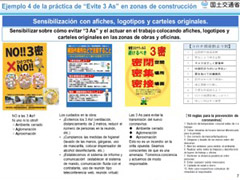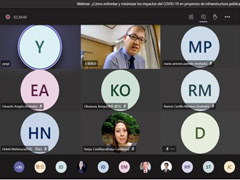How do we face and minimize the impacts of COVID-19 in public infrastructure projects?
Day:2020.10.16
event |
How do we face and minimize the impacts of COVID-19 in public infrastructure projects?
Date: October 16, 2020
Sponsors: JICA (Department of Infrastructure and El Salvador Office)
Location: Online
Mr. Shinji Ohba, Deputy Director for Project Assessment and Conservation, Technical Research Division, Minister's Secretariat, Ministry of Land, Infrastructure, Transport and Tourism
Mr. Hiroki Mochizuki, Chief of Policy Planning, Construction Industry Division, Real Estate and Construction Economy Bureau, Ministry of Land, Infrastructure, Transport and Tourism
Mr. Hideki Nishimura, Nippon Koei, Consultant of the Project for Landslie Prevention in National Road 6 in Honduras
Ms. Roxana mira, Ministry of Public Works and Transport, Project Coordinator of the San miguel Bypass Construction Project in El Salvador
More than 120 people participated, mainly from government implementing agencies, consultants, and contractors of projects in which JICA cooperates.
In Latin America, since the first case of COVID-19 in Brazil was confirmed on February 26, 2020, the infection has spread rapidly in each country, and many countries have implemented measures such as lockdown and airport and border closure. Delays and cancellations occurred in public infrastructure projects, which had a major impact on the construction industry. In addition to the problem of infectious disease, there are concerns about loss of employment and slowing economic growth due to the difficulties brought by COVID-19 in infrastructure sector. At construction sites, efforts such as wearing masks to prevent infection, ensuring social distance, and remote meetings, have been implemented, and governments are making efforts to support infection prevention measures and flexibly respond to contract changes for construction delays and suspensions due to the COVID-19. However, it is still uncertain what kind of measures are appropriate in public infrastructure projects.
We held this webinar to learn about countermeasures in different countries in order to reduce the impact of COVID-19 on infrastructure public works. We invited guest speakers from the Ministry of Land, Infrastructure, Transport and Tourism (MLIT) to explain about the situaion in Japan, and also examples of measures and responses in Central America were shared.
In the first half of this webinar, we introduced examples of efforts for infection prevention in Japan and Honduras regarding countermeasures against COVID-19 at construction sites, and in the second half, we introduced examples of responses by the ordering party (governments) in the case of temporary suspension of construction in Japan and El Salvador. More than 120 people participated, mainly from government implementing agencies, consultants, and contractors of projects in which JICA cooperates.
Mr. Mochizuki from MLIT, who introduced examples of infection control at construction sites in Japan, explained that public works are to be continued during the period of emergency measures in order to maintain social stability. On top of that, he showed examples of measures taken to avoid "3 Cs" (closed spaces, crowded places, close-contact settings) at construction sites and offices where the risk of cluster infection is high, as well as some measures to reduce heat stroke risks. He also introduced examples of practical ways to raise awareness through posters, logos, and signboards at construction sites.
Mr. Ohba also from MLIT, who introduced examples of responses by the Japanese government, said that public infrastructure projects are positioned as projects that require their continuation, and the MLIT does not requiere cancelation or suspention of projects. Rather than asking the contractor to cancel or suspend, the government confirms the situation of the area, where the state of emergency is declared, and make a decision. In other areas, if the contractor requests to suspend the construction, the government does so as requested by the contractor.
In addition, regarding measures deemed necessary to prevent the spread of infection, Mr. Ohba explained that the government is taking flexible measures, such as the change of contracts, extention of the deadline for submitting bidding offers, and use of video camaras for supervision and inspection of works. He also shared the fact that in Japan there were some projects that were temporarily suspended since the end of July; however, there is no such project at this moment in the mid-october, which attracted the attention of the participants.
In the case studies of Honduras and El Salvador, efforts such as temperature measurement and hand washing, disinfection of equipment, and procedures to be taken when infection is suspected were explained. During the webinar, many questions and comments were received through chat, and questions were asked about the necessity of wearing a face shield in the outdoor space of the construction sites and the handling under the contract with the contractor regarding the implementation of infection prevention measures. Many participants commented that it was a very meaningful webinar.
Taking this webinar as an opportunity, we hope that discussions on more effective infection control at the site of public infrastructure projects will proceed for the new normality with COVID-19 and and the post COVID-19.

Presentation "Examples of 'Avoid the 3 Cs' practices in the civil works" by Mr. Hiroki Mochizuki, Chief of Policy Planning, Construction Industry Division, Real Estate and Construction Economy Bureau,Ministry of Land, Infrastructure, Transport and Tourism

Presentation "Actions against the COVID-19 in civil works of direct administration by the government" by Mr. Shinji Ohba, Deputy Director for Project Assessment and Conservation, Technical Research Division, Secretary to the Minister, Ministry of Land, Infrastructure, Transport and Tourism
scroll